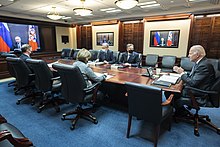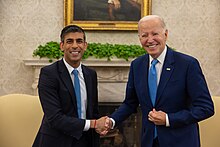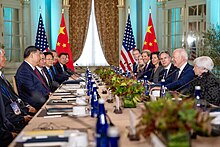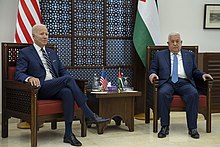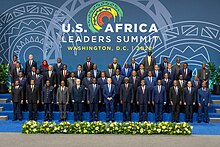Foreign policy of the Joe Biden administration
[48] On August 6, 2021, the State Department placed visa restrictions on 50 immediate family members of Nicaraguan officials accused of benefiting from Ortega's regime;[51] this came amidst an upcoming November 2021 election in which many opposition candidates have been arrested or barred from running.
In Guatemala City, Harris held a joint press conference with Guatemalan President Alejandro Giammattei where she issued an appeal to potential migrants, stating "I want to be clear to folks in the region who are thinking about making that dangerous trek to the United States-Mexico border: Do not come.
[61] The Biden administration sanctioned a key Cuban official and a government special forces unit known as the Boinas Negras for human rights abuses in the wake of historic protests on the island.
[66] In December 2021, 114 Democratic House members signed a letter that urged President Biden to lift restrictions and sanctions against Cuba in order to make their access to food and medicine easier.
Biden and President of the European Commission Ursula von der Leyen agreed on March 10, 2023, to negotiate a common critical minerals stockpile deal and reforms to their respective green industrial policy packages.
"[109] Antony Blinken indicated American interest in robust ties between itself, Greece, Israel, and Cyprus, in response to questioning by Senate Foreign Relations Committee chair Bob Menendez regarding the Eastern Mediterranean Security and Energy Partnership Act.
[168] On 27 September 2022, White House press secretary Karine Jean-Pierre encouraged Russian men fleeing their home country to avoid being drafted to apply for asylum in the United States.
The pipeline project was criticized for the leverage it would have given to Russia in isolating Ukraine,[174] In 2021, a joint statement of the Ukrainian and Polish governments urged Biden to take more decisive action against Nord Stream 2.
[179] The joint statement includes points such as "The United States and Ukraine continue to oppose Nord Stream 2, which we view as a threat to European energy security", endorsed the Normandy Format, and announced cooperation on cybersecurity, satellite awareness and R&D.
[234] On April 11, 2023, Biden visited Belfast where he gave a speech to students at the new Ulster University campus there, and met with the new Prime Minister Rishi Sunak to discuss continuing the Good Friday Agreement on its 25th anniversary, and improving U.K.–U.S.
[253] In an April 2023 speech delivered at Johns Hopkins SAIS, Treasury Secretary Janet Yellen said of US-China economic relations: "The United States will assert ourselves when our vital interests are at stake.
"[257] This occurred after Pompeo, who was Secretary of State under Donald Trump, formally declared that China is committing a genocide against the Uyghurs, which the Biden campaign had previously said half a year prior in a statement in August 2020.
The public meeting was contentious, with Blinken and Sullivan raising questions on China's human rights records, cyberattacks, its threats against Taiwan, its crackdown in Xinjiang and Hong Kong, and other issues of U.S. interest.
The criticisms focused on the mistreatment of the Muslim Uyghur minority, the systematic destruction of democracy in Hong Kong, repeated military threats against Taiwan, unfair trade practices, and lack of transparency regarding the origins of COVID-19.
[273] Shortly, following Blinken's visit, President Joe Biden's reference[274] to Chinese leader Xi Jinping as a “dictator” at an event for his 2024 reelection campaign, drew condemnation from China, which issued a démarche to U.S.
[284] Biden held his first telephone call with Chinese leader Xi Jinping on February 10, 2021; during the call, Biden raised issues of "Beijing's coercive and unfair economic practices" as well as the government's "crackdown in Hong Kong, human rights abuses in Xinjiang, and increasingly assertive actions in the region, including toward Taiwan"; the conversation also involved the COVID-19 pandemic and "shared challenges of global health security, climate change and preventing weapons proliferation.
They agreed to restart cooperation on narcotics crackdowns, a military-to-military hotline, risk and safety management of AI, and increase commercial flights and student exchanges between the two countries, while Biden pledged not to change the U.S. stance of One China, or his concerns over improving China–Russia relations, or his shift toward economic nationalism amid a wave of tech export controls.
[311][312] The review focuses on whether to restore a 2016 order issued by Obama (revoked in 2019 by Trump) that would require the government to issue an annual report disclosing estimates of the numbers of suspected terrorists and civilian casualties, and whether to return to the Obama-era centralized oversight system (in which proposed drone strikes could be approved only if the suspect presented a "continuing and imminent threat" to Americans, and were subject to high-level intelligence vetting in an effort to minimize civilian casualties and blowback) or to keep elements of the Trump-era approach (which was looser and delegated more power to the military and CIA to determine whether to carry out a strike).
[320] Facing mounting criticism for the administration's handling of the event, Biden returned to the White House on August 16 where he delivered an address to the American people defending his decision to withdraw U.S. forces from the country.
[326] On September 24, 2024, the House Foreign Affairs Committee voted to recommend U.S. Secretary of State Antony Blinken be held in contempt of Congress for failing to comply with a subpoena seeking information about the 2021 U.S. withdrawal from Afghanistan.
[369] In May 2024, President Joe Biden blocked a shipment of heavy bombs to Israel, citing concerns about potential civilian casualties in Gaza, particularly in Rafah, where many Palestinian refugees had sought shelter.
[385] The attack came just a day after the Biden administration's special envoy Amos Hochstein visited Israel and warned Prime Minister Benjamin Netanyahu against provoking a major escalation in Lebanon.
[400] In February 2021, the Biden administration publicly released a report (long withheld by the Trump administration) by the Office of the Director of National Intelligence, containing U.S. intelligence's assessment that MBS had approved the Saudi operation that led to Khashoggi's brutal murder in October 2018, basing this conclusion on "the Crown Prince's control of decisionmaking in the Kingdom, the direct involvement of a key adviser and members of Muhammad bin Salman's protective detail in the operation, and the Crown Prince's support for using violent measures to silence dissidents abroad, including Khashoggi.
[426] In August 2023, according to a leaked diplomatic cable at the March 7, 2022 meeting from Pakistan received by The Intercept, the US State department encouraged removal of Imran Khan owing to his neutral stance on the Russian invasion of Ukraine.
[430] Describing the center as a demonstration of "the next step in the US-ASEAN relationship," Elizabeth M. Allen noted it will be "an inclusive and accessible space for scholars to dig into important issues and research," "a convening platform for the diplomatic community and U.S. officials as well as think tankers, civil society, and private sector representatives," "a venue for business roundtables that strengthen networks," "a forum for conferences that engages leading minds and diverse young people on the pressing issues," as well as "a unique site for high level dialogues.
[456] U.S. Agency for International Development (USAID) Administrator Samantha Power, an appointee of President Biden, is scheduled to meet with Ethiopian officials in early August 2021 with the goal of preventing war-induced famine in Tigray.
[475] Biden attended the 47th G7 Summit in June 2021 alongside the U.K.'s Boris Johnson, Canada's Justin Trudeau, Japan's Yoshihide Suga, France's Emmanuel Macron, Germany's Angela Merkel, Italy's Mario Draghi, and the EU represented by Ursula von der Leyen and Charles Michel.
The approach, dubbed “small yard, high fence,” was aimed at slowing China’s development of advanced artificial intelligence and hindering its ability to produce semiconductors that are critical for high-tech products.
The U.S. policies emphasizing domestic production have led to notable shifts in global supply chains, driven largely by the need to mitigate risks associated with U.S.-China trade tensions and rising protectionism.
This comprehensive approach not only strengthens U.S. economic and national security but also aligns with broader foreign policy objectives to build technological alliances, reaffirming the U.S.'s influential position on the world stage.















